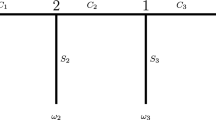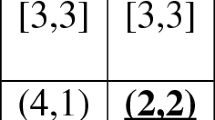Abstract
Two recent papers (Cubitt and Sugden, 1994; Samuelson, 1992) have established impossibility results which cast doubt on the coherence of the assumption of ’common knowledge of rationality'. It is shown that the Cubitt–Sugden result is the more powerful of the two impossibilities. Second, it is proved that the existence of a quasi-strict equilibrium is sufficient to construct sets which satisfy the Cubitt–Sugden axioms. This fact is used to establish that their impossibility result cannot arise in 2-player games. Finally, it is shown that if a weak symmetry postulate is added, a new impossibility result arises for this class of games.
Similar content being viewed by others
REFERENCES
Bernheim, B.D.: 1984, ‘Rationalizable Strategic Behaviour', Econometrica, 52, 1007–1028.
Bernheim, B.D.: 1986, ‘Axiomatic Characterisations of Rational Choice in Strategic Environments', Scandinavian Journal of Economics, 88, 473–488.
Börgers, T. and Samuelson, L.: 1992, ‘“Cautious” Utility Maximisation and Iterated Weak Dominance', International Journal of Game theory, 22, 13–25.
Brandenberger, A.: 1992, ‘Knowledge and Equilibrium in Games', Journal of Economic Perspectives, 6, 83–101.
Cubitt, R. and Sugden, R.: 1994, ‘Rationally Justifiable Play and the Theory of Non-cooperative games', Economic Journal, 104, 798–803.
Harsanyi, J.C.: 1973, ‘Games with Randomly Disturbed Payoffs: A New Rationale for Mixed Strategy Equilibrium Points', International Journal of Game Theory, 2, 1–23.
Myerson, R.B.: 1991, Game Theory, Cambridge, MA: Harvard U.P.
Nash, J.F.: 1950, ‘Equilibrium Points in N-person Games', Proceedings of the National Academy of Sciences of the United States of America, 36, 48–49.
Norde, H.: 1994, ‘On the Existence of Quasi-strict equilibria for Bimatrix Games', Report 9421, Department of Mathematics, University of Nijmegen.
Okada, A.: 1982, ‘A Note on Quasi-strong Equilibrium Points of Non-cooperative Games', Research Report No. B-114, Department of Systems Science of the Tokyo Institute of Technology.
Pearce, D.G.: 1984, ‘Rationalizable Strategic Behavior and the Problem of Perfection', Econometrica, 52, 1029–1050.
Samuelson, L.: 1992, ‘Dominated Strategies and Common Knowledge', Games and Economic Behavior, 4, 284–313.
Tan, T.C.-C. and Werlang, S.R. da C.: 1988, ‘The Bayesian Foundations of Solution Concepts of Games', Journal of Economic Theory, 45, 370–391.
Van Damme: 1987, Stability and Perfection of Nash Equilibrium, Berlin: Springer-Verlag.
Author information
Authors and Affiliations
Rights and permissions
About this article
Cite this article
Squires, D. Impossibility theorems for normal form games. Theory and Decision 44, 67–81 (1998). https://doi.org/10.1023/A:1004968625637
Issue Date:
DOI: https://doi.org/10.1023/A:1004968625637




